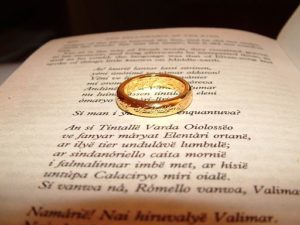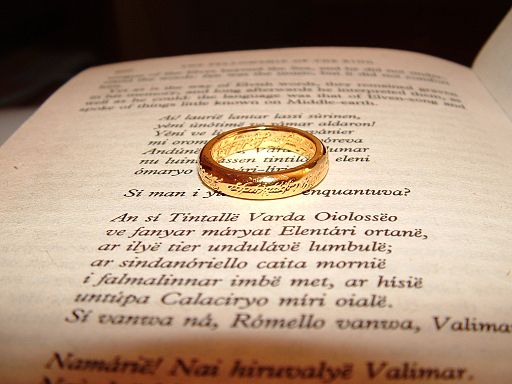Evil And The One Ring To Rule Them All
 Evil is one of the more compelling topics of theology, literature, and philosophy. Does evil exist? If so, where did it come from? And why can’t an all powerful God dispatch it? Fantasy as a genre is dedicated to an examination of evil in conflict with good. As we might expect, the great fantasy writers of the modern era led the way.
Evil is one of the more compelling topics of theology, literature, and philosophy. Does evil exist? If so, where did it come from? And why can’t an all powerful God dispatch it? Fantasy as a genre is dedicated to an examination of evil in conflict with good. As we might expect, the great fantasy writers of the modern era led the way.
J. R. R. Tolkien created some classic representations of evil–corrupted men (the Ringwraiths), a corrupted wizard (Saurman), and a Ring able to corrupt all.
It is the Ring I find most fascinating. As Dr. Michael D.C. Drout (Weaton College) said in Exploring Fantasy Literature: Course Guide
The Ring was made by and belongs to Sauron, the Dark Lord, who is attempting to conquer all of Middle-earth. It was lost many years ago, but now it is trying to get back to its master, who is seeking it. With the Ring, the Dark Lord is effectively invincible. If the Ring were to be destroyed, the Dark Lord would fall. Furthermore (and this is the key gimmick) the Ring cannot be used for good: it is somewhat sentient, and it can turn anyone who uses it for domination into a slave of the Dark Lord.
Tolkien, as most speculative readers know, was not attempting an allegory. Nevertheless, his mythopoetic world, the result of his sub-creation, contains parallels with reality. In fact, his world throws revelatory light on what he believed about certain things in the real world. One of those things is evil.
Based on Dr. Drout’s summary above, I think it’s safe to conclude that Tolkien believed evil existed, that it came from some source other than God, and that it could never be used for good.
These seem to be Biblical positions as well. James 1:13 clearly divorces evil from God:
Let no one say when he is tempted, “I am being tempted by God”; for God cannot be tempted by evil, and He Himself does not tempt anyone.
Throughout Scripture evil or wickedness is contrasted with good or righteousness. Perhaps no passage lays out the duality as clearly as Psalm 1:
How blessed is the man who does not walk in the counsel of the wicked,
Nor stand in the path of sinners,
Nor sit in the seat of scoffers!
But his delight is in the law of the LORD,
And in His law he meditates day and night.
He will be like a tree firmly planted by streams of water,
Which yields its fruit in its season
And its leaf does not wither;
And in whatever he does, he prospers.
The wicked are not so,
But they are like chaff which the wind drives away.
Therefore the wicked will not stand in the judgment,
Nor sinners in the assembly of the righteous.
For the LORD knows the way of the righteous,
But the way of the wicked will perish.
The Apostle Peter reiterates the distinction in his first letter:
“For the eyes of the Lord are toward the righteous,
And His ears attend to their prayer,
But the face of the Lord is against those who do evil.” (1 Peter 3:12)
Notice, however, that this duality of opposition is not a duality of two equal entities. Evil is not a force of equal or greater value in opposition to God.
Genesis 1:1 makes this clear. God was in the beginning, not God and a second god responsible for evil. At the same time, Genesis 1 makes it clear that God did not create evil. All He made was good.
So where does evil come from?
According to Tolkien, the Dark Lord created the One Ring to rule them all, to bind them. Did he believe that the One Ring was the equivalent of Evil or Sin? Hard to say. I’ve not read any commentary on this point. But clearly he created the Ring as a corrupting agent, and since we know from Scripture that Sin taints all Mankind and corrupts the world (see Rom. 8:22), it’s not a stretch to see similarities between the Ring and Sin.
But that doesn’t answer the question about Evil. Rather, the existence of Sauron more nearly addresses that topic. He is the embodiment of Evil in Middle Earth, and the Ring is simply his tool.
In Scripture, the rebellious, fallen angel we know as Satan seems to embody evil. He was the agent of temptation, not only of Eve and Adam, but also of Christ. Nevertheless, his evil is not something he created but is the negation of God. He brought into question God’s word (“Has God said …”), God’s truth (“You surely will not die”), God’s sovereignty (“you will be like God”).
In short, Satan is all that God is not. God is not limited or sinful or selfish or merciless. At the same time, Satan is not what God is. God is all powerful, omniscient, unchanging, wise, good.
Evil, then, is not God. It is in direct opposition to God but it is in no way equal to Him.
Tolkien’s exploration of evil and sin in his stories, as good as it is, falls short in this last point, I believe–perhaps because he has no clear depiction of God (although I could be wrong on this since I haven’t read all his stories).
He shows Sauron as the most powerful force, one that will inevitably win unless the Ring can be destroyed. The Elves and Men are noble because they are committed and willing to die in what appears to be a hopeless cause. In other words, in Middle Earth, Evil has the upper hand.
Is that a reflection of reality? Only if God isn’t painted into the picture. So in The Lord of the Rings, it was accurate, but in real life, though Evil may appear to be winning, there is a great deal more to the story.































C.S. Lewis talked about Satan–I think it was in the preface to Screwtape Letters? How Satan is not the opposite of God. Satan is the opposite of the archangel Michael. If Satan were the opposite of God, he could have nothing good like intelligence or free will. He would be nothing. Satan, while he is powerful, is not all-powerful. He is only a fallen angel.
If you want to read a hair-curling account of evil, you ought to read Lilith by George McDonald. It has some FREAKY imagery in it.
I’ve read that the Lord of the Rings could be used to support both external and internal views of evil…the Ring itself is evil or the Ring tempts the evil within an individual. I haven’t come down on either side of the debate yet.
As for Tolkien’s portrayal of God, that comes into play and is laid out better in the Silmarillion. After Eru creates the Valar, he allows some of them to enter Middle Earth, but on the condition that their powers are bound to it. Eru himself only intervenes once in the Silmarillion–to drown Numinor when its mariners and king attempt to invade Valinor.
In one of his letters, Tolkien admits to creating the Valar to be ” beings on the same level as pagan gods that could be accepted by a mind that believes in the Trinity”–quoted from memory, so I might be a bit off there.
While, as you said, Lord of the Rings is not an analogy, there are still elements of something beyond it.
Tolkien’s sub-creation actually does contain a direct parallel to God. Tolkien’s world is ultimately monotheistic; there is One who is the Creator and Origin of all things. In Tolkien’s world, God is called “Eru” or “Ilúvatar,” although Ilúvatar is never mentioned by name in The Lord of the Rings. I don’t own a copy of The Silmarillion to verify this, but I seem to remember that the first sentence in that book begins with something like “There was Eru, the One, who in Arda was called Ilúvatar.”
I strongly disagree. I hate to sound like a snob, but I feel that you have missed one of the most important themes. Even though “Ilúvatar” is not mentioned in The Lord of the Rings, one of the most prominent themes is that Evil does not control the destiny of Middle Earth despite the fact that even the most good and noble of Elves and Men and Wizards are all flawed and unworthy.
As evidence, I offer this paragraphs from Chapter 2, “The Shadow of the Past,” Gandalf’s dialog to Frodo:
(Spoiler for the climax of the trilogy below, just in case someone may not have read it.)
I think the sense of hopelessness has to be genuine, because there really is no rational source of hope in the good forces of Middle Earth. No one can withstand Sauron’s power, and no being is good enough or strong willed enough to resist the influence of the Ring. Even Frodo failed to resist the temptation of the Ring. It is very significant that Frodo failed to drop the Ring into the fires of Mount Doom. He would have claimed it for his own had not Gollum attacked him and bitten off his finger, something that was enabled by Frodo’s previous mercy on Gollum but was utterly out of everyone’s control. Thus, Middle Earth was saved by Providence.
I think in one level, there truly is no hope. But then, there is a transcendent hope beyond earthly hope.
[…] I wrote a post at Spec Faith about evil as I believe J. R. R. Tolkien understood it. One point stood out as I wrote the article–the […]
I heartily enjoyed with and agreed with most of this article. Except the very tail end.
I disagree. As Bainespal noted above throughout the story there is a ‘providence’ distinctly working in the story.
For instance, it is explicitly stated that Gandalf didn’t raise himself from death:
Clearly, a higher power is at work, since Someone more powerful than death and with authority even over Gandalf had to do the sending of him. More powerful than death — and thereby clearly more powerful than Sauron, and opposed to him, since overthrowing Sauron was the specific task given to Gandalf.
Another example of this Providence that comes to mind is when Sam and Frodo are on their final stretch to Mt. Doom:
And further on:
Lastly, you said,
So too in Lord of the Rings. Evil appeared to be winning, but woven throughout the tale, we see glimpses of the fact that there is more to the story. I think Tolkien shows a realistic view, displaying that even though evil is powerful, it will always ultimately be thwarted by God’s providence, which as often as not He displays through those who follow Him.
[…] on Speculative Faith addressed the issue of evil in relation to Tolkien (Rebecca Miller did, more than once, and Anthony Cirilla had some very interesting observations about the Hobbit, though not […]